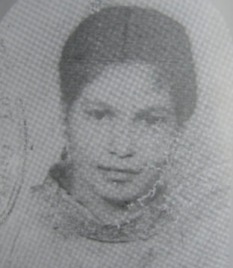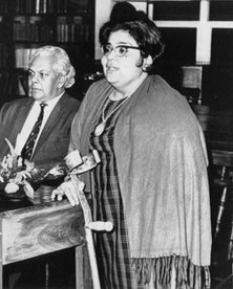|
March is Women’s History month, a time to celebrate women’s lives, the progress we have made throughout the years, and the bright future ahead of us. This year marks the 30th anniversary of recognizing the tireless work women have put into creating change. Often, it seems that the history of women is written in invisible ink. Therefore, to commemorate the month, we are writing women back into history by remembering the Indo-Caribbean women who were revolutionaries before us and honoring the historical work we are doing today. Below are tributes to two extraordinary Indo-Caribbean heroines who continue to give us strength and inspiration today. We invite you to post comments, sharing stories about your Indo-Caribbean heroines of the past and present in celebration of Women's History Month! Kowsilla, Guyanese Labor Activist Who Made the Ultimate Sacrifice Kowsilla, also known as Alice, of Leonora, was killed on March 6, 1964 during the great Sugar Strike of 1964. Her body was severed in two when a sugar estate scab, Felix Ross, drove a tractor through her. He was later acquitted. A mother of four at the time, and the sole breadwinner of her family, Kowsilla was an executive of the Leonora branch of the WPO and, as a leader, she paid the ultimate price by displaying the highest order of resistance for her belief in adequate wage for adequate work. Despite her struggle for her people, Kowsilla’s story has rarely been documented. At Jahajee Sisters, we remember Kowsilla’s courage and refuse to let her sacrifice disappear into the historical void so many women’s stories fall into. Rajkumari Singh, Guyanese Cultural Heroine Rajkumari Singh, A.A. (1923-1979), stands out as a major pioneering Caribbean woman writer, political activist, educator and distinguished cultural leader in her native land, Guyana, where she received national honors. She was respected and praised by her contemporaries for the quality of controversy, criticism and debate present in her works, for which she received many literary prizes and awards; she is revered by numerous younger poets, writers, scholars, artists and performers, to whom she was a patron and mentor. Rajkumari was concerned with Indo-Caribbean identity finding their place in a region undergoing harsh and disappointing political, cultural and social change. These critical issues found their way into her literary work. Rajkumari's legacy continues to inspire new generations in the Caribbean and in countries of the Indian Diaspora.
3 Comments
[RE-POSTED FROM WRITING THE LINES OF OUR HANDS BLOG--This blog was created to chronicle the publication progress of Writing the Lines of Our Hands: An Anthology of South Asian American Poetry, to provide a forum for conversation and support among the authors of this anthology, and to facilitate conversations about writing by South Asian Americans.] |
AuthorJahajee Sisters Advisory Committee Archives
September 2011
Categories
All
|

 RSS Feed
RSS Feed
